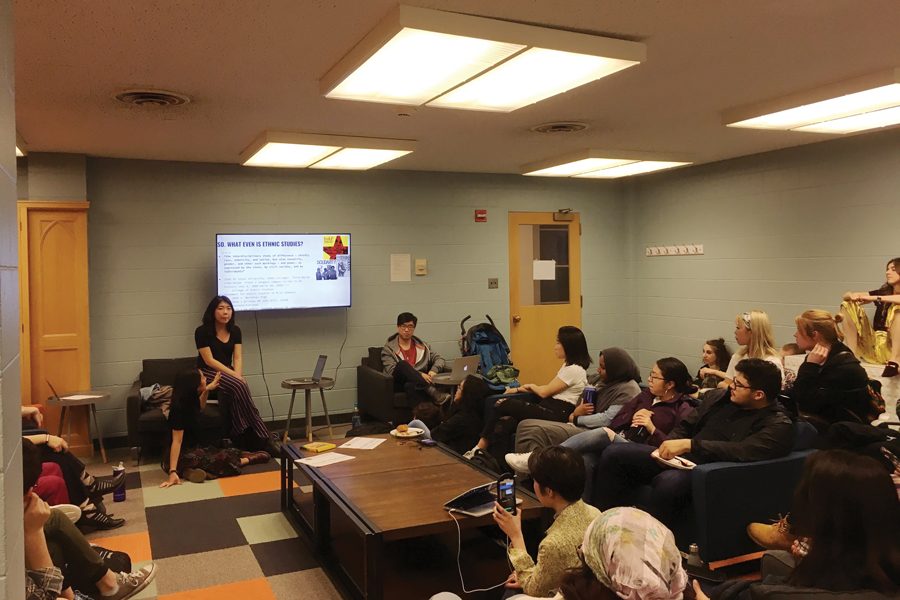Latinx Asian American Collective updates students on departmentalization at teach-in event
Alan Perez/Daily Senior Staffer
Members of the Latinx Asian American Collective update students Thursday on efforts to turn the Latina and Latino Studies and Asian American Studies Programs into departments. The members said meetings with administrators have not developed into steps toward departmentalization.
April 27, 2018
Members of the Latinx Asian American Collective said meetings with Weinberg administrators have been largely unproductive, generating skepticism among the group about whether the college will turn the Latina and Latino Studies and Asian American Studies Programs into departments.
The collective held a teach-in on Thursday, presenting updates on their efforts to more than 40 students gathered in Parkes Hall. Members said meetings with Weinberg Dean Adrian Randolph and Mary Finn, Weinberg’s associate dean for undergraduate academic affairs, have not developed into concrete steps toward departmentalization.
“The simple summary of our meetings so far is that the administration got our message about our programs’ struggle with stability in terms of funding, faculty and courses,” Weinberg sophomore June Choe said. “But they refuse to give us a straightforward answer as to whether departmentalization is a possibility.”
The effort for this change began last fall, when concerned students started brainstorming and meeting with faculty members to identify deficiencies in the programs, Choe said. The group began a social media campaign during Winter Break and released a finalized proposal petition in January. The movement gained widespread support among students, receiving more than 1,000 petition signatures and statements of support from more than 30 student groups, he said.
Students and faculty have said the programs lack adequate funding to hire faculty and conduct research. Additionally, the inability to hire tenure-track faculty limits the availability of courses and forces professors — and even the programs’ directors — to split time with other departments, they said.
Randolph told The Daily in January that he is “proud to have such strong interdisciplinary programs,” but stopped short of indicating any move toward departmentalization.
“They play a significant role within our intellectual community,” he said. “The difference between a program or department is primarily a difference in administrative structure and scale; it does not in any way reflect the importance the University or the College attaches to a particular academic discipline or course of study.”
Several barriers remain before the programs have any chance of being recognized as departments, members of the collective told The Daily. Weinberg junior Jessica Wang said Randolph has suggested he doesn’t believe faculty members are “on the same page,” and asked students to demonstrate faculty support.
But she said the faculty actually have shown support, noting a February letter to the editor submitted by the programs’ directors.
Administrators have also asked students to demonstrate the need for additional resources and faculty, Wang said, despite repeated requests by both directors for more funding. As a concession, administrators suggested they would allow the programs’ faculty to obtain tenure status, Choe said.
Though that change would give the programs one of the major advantages of department status, Weinberg sophomore Seri Lee said the recognition of department status is still needed.
“With that comes a lot of symbolic power and a lot of legitimacy, which has been historically denied to us since the establishment of ethnic studies as a discipline,” Lee said.
Email: aperez@u.northwestern.edu
Twitter: @_perezalan_


